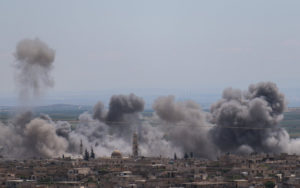In just one week, from April 28 to May 6, 152,000 people were forced to flee their homes in Syria according to a report from the United Nations Office for the Coordination of Humanitarian Affairs (UNOCHA), doubling the number of displaced persons in the northwest since February. A renewed Russian-backed Syrian government offensive has brought about the biggest escalation in the war between President Bashar al-Assad and his enemies since last summer, with civilians again bearing the brunt of the violence, as they are caught in the crosshairs.
Renewed violence in the rebel-held northwest has killed dozens of civilians under circumstances that may violate international law. The UNOCHA report states that during the week in question, airstrikes and shelling in more than 50 villages killed at least 80 civilians and injured 300 more. Airstrikes struck twelve health facilities and destroyed 10 schools. Physicians for Human Rights reports that “coordinates for at least three of the attacked [medical] facilities were shared through the UN’s deconfliction mechanism but were targeted anyway. This suggests that the attacks were intentional — not accidental — in nature.”
Since last October, the rebel holdout of Idlib has been relatively calm, with rebel and pro-government forces separated by a demilitarized buffer zone created via a September 2018 Russian-Turkish deal that placed the onus of dismantling the rebels on Turkey. However, since the end of April the tenuous ceasefire has begun to fray, with deadlines of the Sochi agreement repeatedly going unmet and with each side accusing the other of violating the deal’s terms.
Thousands reportedly headed back to their homes after the demilitarized zone came to fruition. With this new onslaught of violence, 1.5 million civilians in Idlib and its environs are once again in danger. But not everyone has the capacity to flee again. According to a White Helmets spokesperson, “Some villages in southern Idlib and northern Hama are still inhabited by some civilians — either because they have no place to go, or they cannot afford the expenses involved in displacement.”
Earlier this week, the Union of Medical Care and Relief Organizations (UOSSM) foresaw an “apocalyptic scenario” for civilians should violence continue to escalate. The coalition of medical care providers reported that 13 medical facilities were bombed in the last two weeks alone, in direct contravention of international humanitarian law. The insecurity has forced numerous NGOs to shutter their operations completely.
The international community has expressed much-warranted concern over this disintegrating situation. U.N. Secretary-General António Guterres expressed alarm at disturbing reports of “aerial attacks on population centers and civilian infrastructure.” Despite Russia, Turkey, and Iran —those powers with direct influence and military clout in Syria — reiterating their commitment to maintaining the ceasefire and demilitarized buffer zone in Idlib, the fighting continues unabated.
The Syrian-Russian Alliance has systematically targeted civilian infrastructure throughout the conflict as a modus operandi and central pillar of its war strategy. The Syrian Network for Human Rights (SNHR), the leading monitoring organization on the conflict, released a report on May 8 concluding that the alliance forces are perpetrating offenses against innocent Syrian civilians that constitute war crimes, and that the international community is doing nothing to put an end to these atrocities. To be clear, attacks on health facilities and schools are mass atrocity crimes. Such violations during armed conflict constitute war crimes, and if done systematically on a wide scale they may rise to the level of crimes against humanity.
The alliance’s seemingly targeted attack on health facilities throughout the eight-year protracted conflict is largely what motivated Jewish World Watch to seek out innovative means of delivering vital medical supplies and services to the civilians of Idlib. JWW has been partnering with an organization that uses its global connections to source affordable medical supplies and deliver them directly to doctors providing care to Syrian civilians in Idlib province. Distribution of supplies in the most recent JWW-funded container began in January 2019 to four main hospitals. As of the date of publication, we do not know if those hospitals survived these most recent targeted attacks. We do know that the brave doctors have used JWW-funded supplies to set up makeshift triage facilities outside of traditional hospital settings to save critically sounded civilians who are at risk of perishing before reaching standing hospitals that are often miles away.
Fadel Abdul Ghany, the Chairman of SNHR, adroitly summarized the international community’s responsibility to ensure this ceasefire is reinstated: “It is true that the countries that have concluded the [ceasefire agreements] have the responsibility to maintain the ceasefire and not to commit violations of the agreements, but these agreements should not make us forget that there is a law of war…and that many of the violations that are currently committed constitute war crimes, and that the responsibility to fight war crimes according to the four Geneva Conventions rests with all countries that have ratified them, and they must act to stop war crimes and crimes against humanity in Syria.” The international community must unite in denouncing these crimes against Syria’s war-beleaguered civilian population and apply maximum pressure on the Syria-Russian alliance to stop its deliberate, widespread, and systematic targeting of civilians as a weapon of war.
All parties to the conflict must be held to the tenets of international humanitarian law, minimize the impact on civilians, and ensure their protection. Syrian government forces and their Russian allies, as well as all rebel groups operating in Idlib province, must commit to an immediate ceasefire and the full implementation of the demilitarized buffer-zone agreement.
Additional resource: https://reliefweb.int/sites/reliefweb.int/files/resources/20190509_acaps_start_briefing_note_displacement_northwest_syria.pdf


